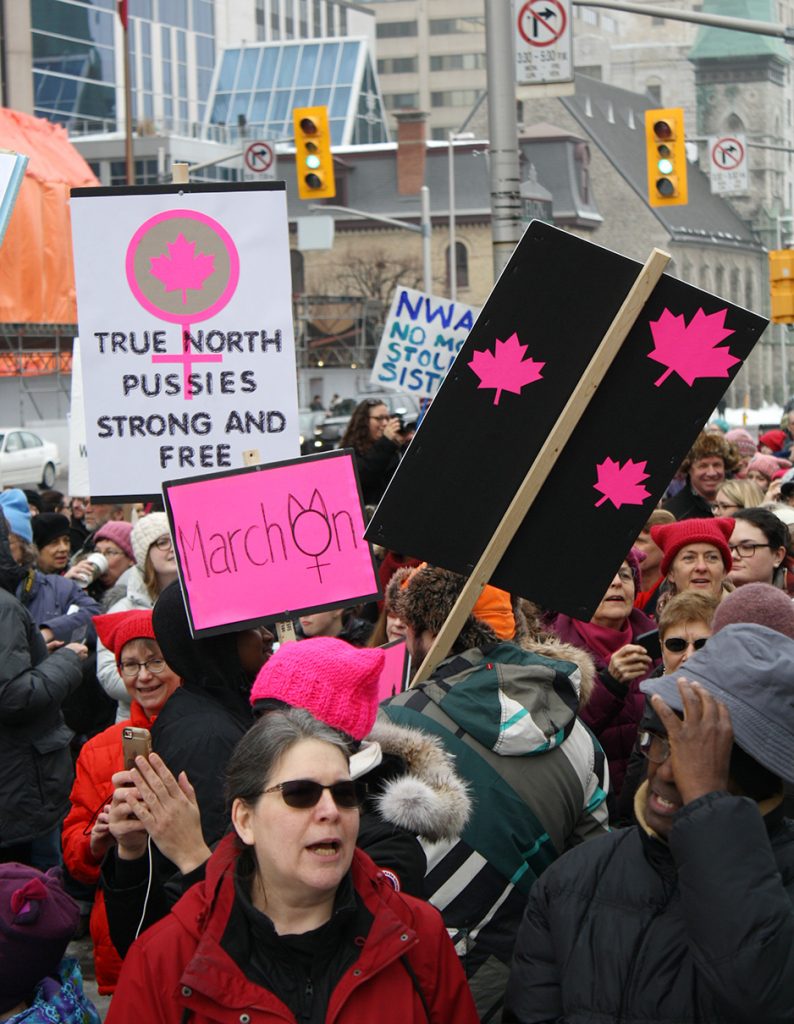Ottawans march for rights
By Mona Mahmoud and Caroline O’Neill
Centretown resident Karin Frederking is a self-proclaimed feminist, a member of the LGBTQ community and mother of a daughter.
Those were just some of the reasons behind her decision to go to Washington to join an estimated 500,000 women in the Women’s March on the U.S. Capitol on Jan. 21, barely 24 hours after Donald Trump was sworn in as the 45th president of the United States.
“My mom attended the 1963 civil rights march,” said Frederking, “and she’s been an inspiration to me as a social activist for many years.”
Her mother, Ann Frederking, participated in the March on Washington for Jobs and Freedom in August 1963. That march culminated in Martin Luther King Jr.’s famous “I Have A Dream” speech, becoming a key event in the fight for economic equality for African Americans.
Frederking, a dual Canadian-U.S. citizen, was one of about 50 Ottawa residents who signed up to take a bus from Ottawa to Washington, leaving on Jan. 20 and returning on Jan. 22.
Somerset Coun. Catherine McKenney and Gloucester-Southgate Coun. Diane Deans were also among the throngs of women from around the world who attended the Women’s March on Washington.
The group Canadian Women’s March also sent seven buses carrying 54 delegates each to join the rally in D.C., including one bus from Toronto. Three others buses, one chartered by the organization Democrats Abroad, also left from Ontario.
According to the official website for the march, the goal behind the movement was to “send a bold message to (America’s) new government on their first day in office, and to the world that women’s rights are human rights.”
Frederking said she followed the U.S. election closely and became nervous when she heard the controversial statements that Trump made during his campaign.
“Donald Trump’s rhetoric has been very undermining to females and the LGBT community,” Frederking said. “I’m concerned about the kind of repercussions his administration will have on the American people — it will no doubt affect the rest of the world.”
But the Jan. 21 event, which prompted sister demonstrations in Ottawa, Toronto, Vancouver and hundreds of other cities around the world, wasn’t just an anti-Trump march.
Tamika Mallory, national co-chair of the Women’s March on Washington, stated that participants who were marching just to protest Trump do not understand the vision behind the movement.
“He is a symptom of a disease that already existed,” Mallory said in a pre-march Facebook Live interview with Essence Magazine. “He’s just going to give new voice to white supremacy, the racism, the sexism, the misogyny, all the stuff that was already there.”
According to its website, the Women’s March on Washington also advocated for the protection of reproductive rights, an end to race-based violence — including incidents committed by the police — and protection for LGBTQ freedoms, among others.
The solidarity march in Ottawa began at the Human Rights Monument on Elgin Street, proceeded through the downtown core and wound up at the Bronson Centre for speeches in the facility’s main auditorium.
The turnout at the Ottawa march was much larger than expected, with an estimated 6,000 to 8,000 people in attendance, according to Ottawa police.
Local organizers said their main purpose was to deter bystander culture in the face of new threats to women’s rights.
This story was produced in collaboration with iPolitics.

